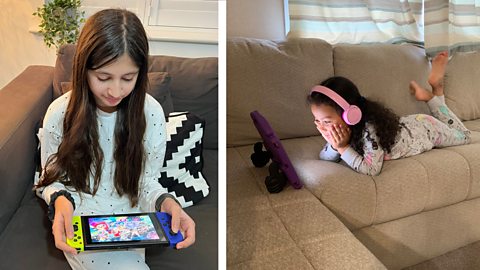Children can get so involved in their gaming that parents are often surprised at how intensely emotional they can get about it. By understanding what’s going on for your child, and following some basic guidelines, you can better support your gaming child.
Psychotherapist Dr Aaron Balick offers his tips for developing a better understanding of your child's relationship with games and helping them to deal with the emotional impact of their gaming.
Cardinal rule - be curious
Dr Aaron Balick: Hi there, I'm Dr Aaron Balick, I'm a psychotherapist. I'm here to give you some advice and top tips about how to manage your kids emotions around their gaming. Now the cardinal rule when it comes to our children and gaming is to be curious. By being curious, we increase our understanding of why our kids are into their games and why they have the reactions that they do. We get inside their heads, why they get excited and also, why they get frustrated. If we're not curious about their gaming, then we lack this understanding, which means that the road forward isn't going to be smooth. With a bit of curiosity, a bit of understanding, that can save us a lot of time, and a lot of emotional hotness down the road.
The main mistake parents make is not understanding the gaming world from their child’s perspective. For many parents, it’s just like another world completely – something they don’t understand. However, not understanding means it’s easier to make mistakes – namely by not appreciating how seriously your child takes their games.
Gaming may not be up your street, but it pays to be curious. Ask your child to show you their game, try it out yourself. Find out what they like about it and why they play. By getting inside your child’s mind, you’ll be much better placed to deal with the feelings these games bring up, and help to set reasonable boundaries about their game use.
Just because it's online doesn't mean it isn't real
Dr Aaron Balick: Just because a game is online doesn't mean that it's not real, okay? Those of us who are a slightly older generation than our kids tend to dismiss the stuff that goes on online, and we don't understand why kids are getting so upset about what's going on there. Well let me tell you something, emotions are real and your brain doesn't know the difference about whether you're disappointed or frustrated online or in real life. So do take your children's feelings and emotions seriously about what happens online. The more you dismiss it, the more angry they are going to get because they're going to feel like their feelings aren't being recognised. And that's why understanding is so important.
One of the mistakes many parents make is dismissing gaming as 'not important' which is like a red flag to a bull. Kids (and adults too) can take their gaming very seriously and it is a kind of disrespect to belittle it. It’s also worth remembering that games can teach both practical skills like problem solving, as well as social skills, like teamwork.
Instead of dismissing gaming, try and find out why your child is so upset when something bad happens within the game. Gaming can be an aspect of a child’s self-expression – so it’s important to take it seriously.
The best boundaries are negotiated
Dr Aaron Balick: Another great big tip is about boundaries. You're going to want to set boundaries in advance so it's really clear that these things are agreed. What kind of games can be played? When can those games be played? How much time? So there might be less time for example on school nights than on weekends. We want to make sure that those games are age appropriate, we want to make sure games aren't being played just before bed so they don't disrupt sleep. Now the best boundaries we have are negotiated boundaries, that means that you bring your child in on that discussion so they can feel a part of that discussion and they help create those boundaries together. That builds trust and obviously when that trust is broken, those boundaries should be renegotiated.
Life skills are learned both inside and outside of gaming – and an important one is boundaries. Depending on the age of your child, boundaries can be directive (coming from the top) or negotiated.
Parents should be directive about some boundaries like ensuring games are age-appropriate, but there is room for negotiation too.
By setting expectations together, you can get ahead of conflict that might arise without those expectations. Including your child in those expectations shows understanding and respect – and will help (in theory!) getting them on board with them. You might consider working out:
How many hours a day are acceptable
When those hours are
What the consequences will be if agreements are broken
A clear set of guidelines between you can do a great deal to head off conflict in the future – and boundaries can be changed based on how well-respected they are by both sides.
Be realistic about how games work
Dr Aaron Balick: Another tip is to be realistic about how games work. Now boundaries work in theory, but sometimes a game doesn't finish right on the hour, right? Maybe a level has to be finished or there's something going on socially there, so understand with your child how those games work and build in a little bit of flexibility and margins with those boundaries. So for example, if dinner is going to be at 6 o'clock and the agreement is that gaming finishes at 6 o'clock, maybe you need to shift that a bit. Offer about ten or fifteen minutes if something goes over to be completed. It shouldn't happen all the time, but if it's a negotiated boundary, "I will finish this level, I won't start a new level ten minutes before dinner", that's going to go a whole lot more smoothly too.
Most conflict arises when one person feels like they’re a victim of an unfair decision. For example, a parent might think it’s reasonable to ask their kid to stop playing immediately because dinner is on the table, but their child is on the verge of completing a challenge they’ve been working on for weeks. So anticipate these possibilities when making boundaries.
Try making boundaries with a degree of flexibility. For example, the cut-off point is 6:30 for dinner, so your child should know better than to start a new round at 6:20. However, including some margin, say 10 minutes or so to finish something up, may well be worth it – so long as it’s not abused.
Of course, these kinds of deals are built on mutual trust – so they may need to be revisited again if they are not respected – and your child can expect to be less part of the negotiation for a while if so.
Remember how your child's brain works
Dr Aaron Balick: Another tip is to remember how your kid's brain works, okay? Now here's a big word for you, it's called executive functioning, and executive functioning doesn't actually come online fully until you're in your early 20s. What does executive functioning do? It helps you manage the more impulsive parts of your brain. Our kids haven't really developed that so they tend to be more impulsive than we are, so you might need to give a little bit of patience around the impulsivity about your children. It is normal, you might just have to be patient with it.
Quite simply, neuroscientifically, children’s brains are more impulsive and reactive than adult brains. That means emotions can run very hot at times and impulse control is naturally low – it’s not their fault. Delaying gratification is particularly hard for children. So, if your child is just about to achieve something in a game and you ask them to put it down, they might snap at you and seem unreasonable, but this is likely why.
This isn’t to say they should have a free pass to be rude or misbehave, but it can help you to understand why they might easily get upset – and offer an opportunity to work through these emotions.
Take your child’s emotions seriously, even if they seem out of perspective. The emotions themselves are real and a little patient understanding can go a long way.
Also, try not to be reactive yourself when your child is highly emotional – you can help regulate their intensity by trying to approach the situation calmly yourself (I know it’s easier in theory).
Gaming can be for you both
Dr Aaron Balick: Another top tip for you is that gaming doesn't just have to be for your kids. You can offer some shared gaming time. By sharing the gaming time, you increase this thing we were talking about before which is understanding the curiosity about the games, you can also enter your child's world at their level. Most of us, I include myself, aren't quite as good at the game as the kids are so they might get frustrated with you and maybe ten minutes is enough, but it's something to check out and to try and see how you go. If you follow these guidelines, most of the things should go smoothly most of the time. Of course that's not 100 percent of the time, but that's life. But there are a few things that you should look out for if your child's mood changes drastically, if they're withdrawing from the world, if they seem to get anxious or depressed if they don't have access to their games, if they need their games to feel okay, there are some warning signs there. So if you see some of these warning signs, then you might want to seek some professional help and have a talk with someone who can work you through that.
Have you considered playing games with your child? Shared gaming time can be productive, and even if it’s not your thing, you will be getting a much better glimpse into your child’s world, which can help you understand why they feel the way they do. It’s also great for shared family time. A balance of independent gaming and gaming as a shared activity could enhance your relationship.
Bear in mind that a grown up’s thumbs on a control pad may sometimes be less up to the job than a child’s, so they may not be so keen on being slowed down by you. However, your display of interest can go a long way.

Warning signs
Most of the ups and downs of childhood gaming emotions are normal – but there are a few things to watch out for.
For most children, most of the time, abiding by these guidelines should help everyone deal with the emotional world of a gaming child. However, sometimes things can tip into a zone of concern. There may be something a bit more serious going on if your child:
Can’t take time away from gaming without getting very angry, anxious, or depressed
Loses interest in other activities that aren’t gaming
Changes their routine or is deceptive about gaming
Is moody, more aggressive, depressive, or angry
Withdraws from relationships with others
If this sort of thing is happening, then it may be time to get some professional advice to help you deal with it.
Dr Aaron Balick is a psychotherapist, helping people with their psychological and emotional wellbeing.
If you or your child is concerned about their gaming, you may want to speak to your GP or otherwise, BBC Action Line have details for a number of organisations that can help.

More from BBC Bitesize Parents' Toolkit…
Parents' Toolkit
Fun activities, real-life stories, wellbeing support and loads of helpful advice - we're here for you and your child.

How to manage your child’s online world without clashing
Children and teens spend lots of time online for school and leisure, which can be a worry for parents. Here's some advice on managing your child’s screen time.

Dear Parents' Toolkit... How much screen time is too much?
Parents across the UK share their thoughts on screens and internet safety. Should I use them in parenting? What is 'screen guilt'? And how do I get my child away from them?

How technology has made parenting more difficult and how to navigate it
BBC Bitesize Parents' Toolkit looks at how widespread access to the internet for our children is causing clashes at home, with negative and positive aspects.

How to help your family enjoy a screen free week
BBC Bitesize Parents’ Toolkit takes a look at the ways you can take part in a screen-free week and how it can benefit you and your children.

